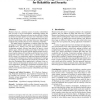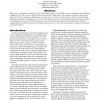49 search results - page 2 / 10 » Address-Space Randomization for Windows Systems |
ASPLOS
2008
ACM
13 years 7 months ago
2008
ACM
Memory errors are a notorious source of security vulnerabilities that can lead to service interruptions, information leakage and unauthorized access. Because such errors are also ...
CORR
2010
Springer
13 years 5 months ago
2010
Springer
With the discovery of new exploit techniques, new protection mechanisms are needed as well. Mitigations like DEP (Data Execution Prevention) or ASLR (Address Space Layout Randomiz...
SRDS
2007
IEEE
13 years 11 months ago
2007
IEEE
Code injection attacks are a top threat to today’s Internet. With zero-day attacks on the rise, randomization techniques have been introduced to diversify software and operation...
CMG
2003
13 years 6 months ago
2003
Many server workloads can exhaust the 32-bit virtual address space in the Windows server operating systems. Machines configured with 2 GB or more of RAM installed are particularly...
ACSAC
2009
IEEE
14 years 4 days ago
2009
IEEE
—To strengthen systems against code injection attacks, the write or execute only policy (W⊕X) and address space layout randomization (ASLR) are typically used in combination. T...


